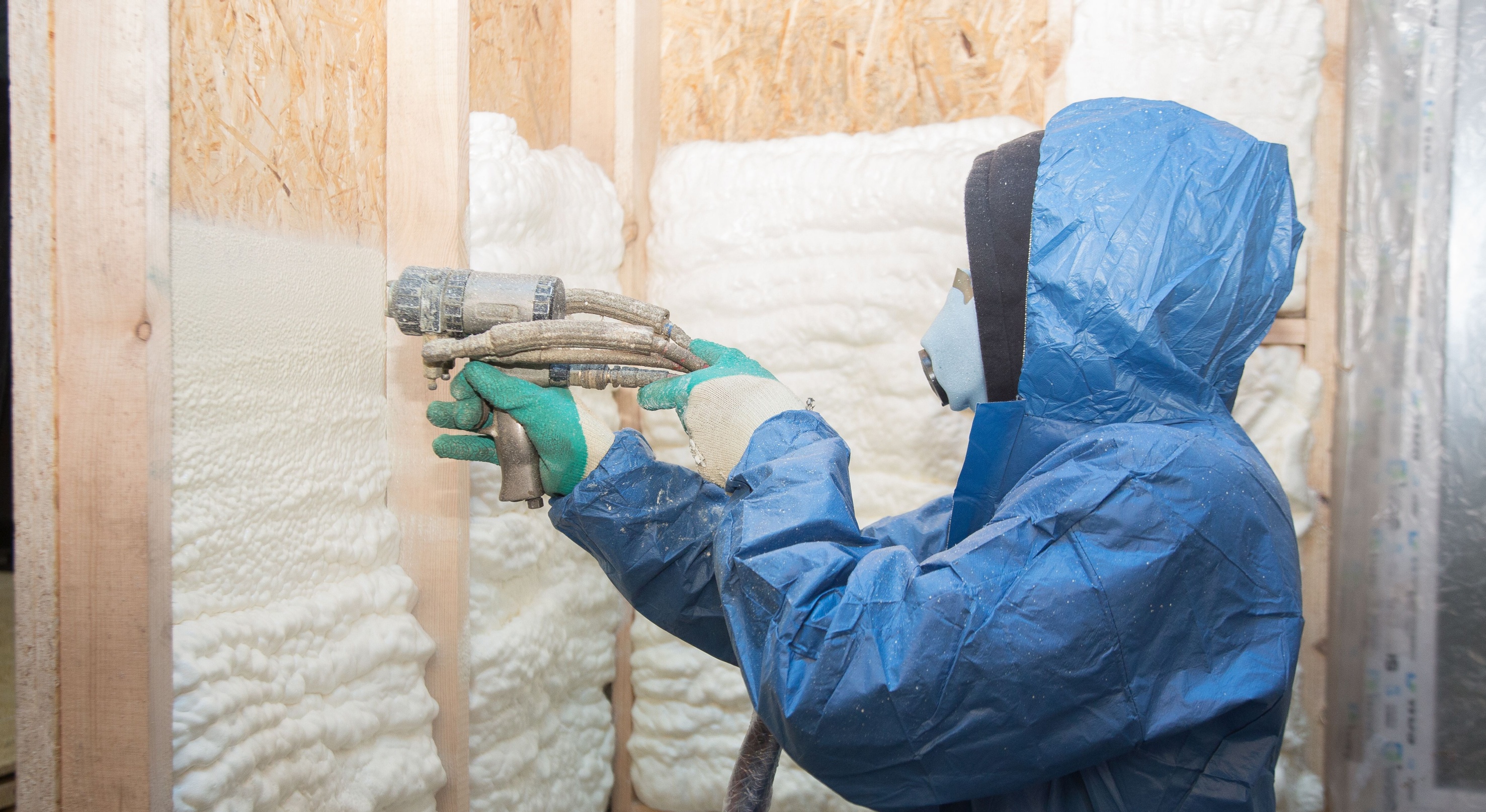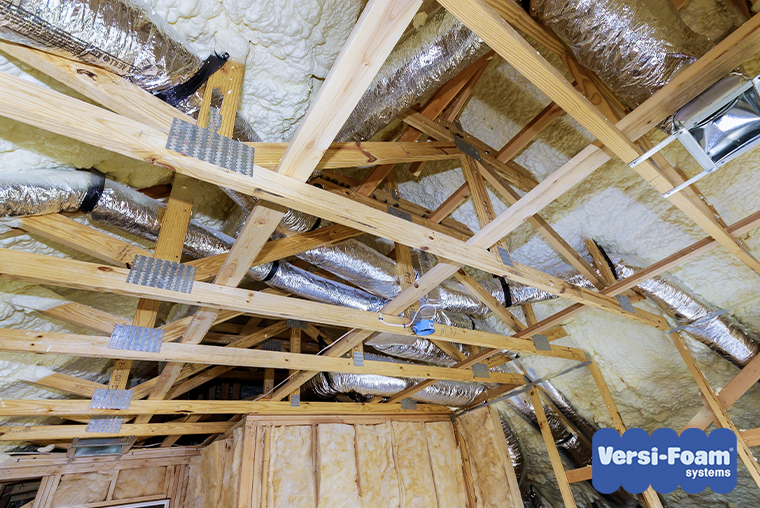How Spray Foam Can Enhance Power Performance in your house
How Spray Foam Can Enhance Power Performance in your house
Blog Article
Spray Foam: The Ultimate Solution for Air Sealing and Insulation
Spray foam insulation has arised as a leading remedy for efficient air sealing and thermal insulation, providing a distinct combination of residential or commercial properties that set it apart from typical approaches. Comprehending the full extent of its advantages, setup processes, and contrasts with other insulation types is crucial for making educated decisions.
What Is Spray Foam?
Spray foam is a versatile insulation product that integrates the principles of air securing and thermal resistance to improve energy performance in buildings. Made up mostly of polyurethane or other comparable compounds, spray foam is used as a fluid that expands upon call with surfaces, developing a solid, continuous layer of insulation. This special residential property allows it to load gaps, splits, and spaces that traditional insulation products might ignore, providing a remarkable air seal.
There are two major kinds of spray foam: open-cell and closed-cell. Open-cell spray foam is lighter and a lot more flexible, using outstanding audio absorption and a lower R-value per inch - Spray Foam. In comparison, closed-cell spray foam is denser, providing a greater R-value, wetness resistance, and included structural honesty to building elements
The application procedure generally entails specialized devices, making certain a seamless application that abides by numerous substrates, consisting of timber, metal, and concrete. This versatility makes spray foam ideal for both new buildings and retrofitting existing frameworks. Its capacity to create a closed obstacle dramatically adds to decreasing power intake and boosting indoor air quality, thus making it a recommended selection amongst house owners and building contractors alike.
Advantages of Spray Foam Insulation
One of the most significant advantages of spray foam insulation is its extraordinary capability to produce a constant air obstacle, which successfully lessens power loss. Unlike typical insulation products, spray foam broadens to fill up fractures and spaces, guaranteeing that air leakage is dramatically minimized. This particular not only enhances energy efficiency yet additionally brings about decrease energy expenses in time.
Additionally, spray foam insulation provides superior thermal resistance, adding to an extra steady indoor environment. Its high R-value per inch enables reliable insulation in constrained areas, making it optimal for attics, walls, and crawl rooms. The moisture-resistant homes of spray foam help protect against mold and mildew and mildew development, promoting healthier living problems.
One more vital benefit of spray foam insulation is its sound-dampening top qualities (Spray Foam). It efficiently reduces sound transmission between spaces, creating a quieter and a lot more comfortable home setting. The resilience of spray foam likewise attracts attention, as it does not droop or clear up over time, preserving its efficiency throughout its lifespan
How Spray Foam Works
Comprehending just how spray foam insulation functions is necessary for appreciating its performance in air sealing and thermal resistance. Spray foam insulation includes two main components: isocyanate and polyol resin. When these parts are mixed, they go through a chemical response that triggers the product to increase rapidly, producing a thick foam that fills cracks, dental caries, and gaps.
As the foam increases, it sticks to surfaces, forming a closed seal that dramatically reduces air infiltration. This characteristic makes spray foam insulation extremely reliable at preventing drafts and moisture penetration, which can result in energy loss and damage gradually. In addition, the closed-cell version of spray foam supplies superior thermal resistance due to its rigid structure, efficiently reducing warm transfer.
The special click for more residential or commercial properties of spray foam allow it to comply with irregular surfaces, guaranteeing extensive coverage and a seamless obstacle. Therefore, spray foam insulation not just boosts power effectiveness however also contributes to improved interior air top quality by minimizing the build-up of allergens and pollutants. Inevitably, comprehending the auto mechanics behind spray foam underscores its role as a premium selection for insulation and air sealing in both business and property applications.
Installation Refine Summary

Prior to setup, the area needs to be sufficiently cleaned and prepped, ensuring that surface areas are without particles, wetness, and dirt. This action is critical because impurities can endanger adhesion and general efficiency. Once the area is prepared, the application involves blending both components of the spray foam, which increases upon get in touch with and loads gaps efficiently.
Trained professionals ought to perform the setup, utilizing specific devices to ensure uniform insurance coverage and optimal density. Safety and security precautions, consisting of putting on Check This Out safety equipment and guaranteeing appropriate ventilation, are important during this procedure. After application, the foam commonly cures quickly, creating a strong barrier that boosts energy efficiency.
Comparing Spray Foam to Traditional Insulation
When reviewing insulation alternatives, spray foam insulation stands out in contrast to typical products such as fiberglass and cellulose. Unlike fiberglass and cellulose, which can enable air seepage, spray foam broadens upon application, filling up gaps and gaps to create a closed seal.
Furthermore, spray foam offers a greater R-value per inch than standard insulation types, offering even more reliable thermal resistance in a thinner profile. This characteristic is particularly helpful in spaces with limited cavity depth. Spray foam is immune to wetness and mold growth, which can be a significant concern with cellulose and fiberglass, specifically in moist atmospheres.
Nevertheless, spray foam insulation generally carries a higher ahead of time expense than its traditional counterparts. House owners must evaluate this preliminary investment versus long-term energy financial savings and performance benefits. Eventually, while both insulation types offer their purpose, spray foam emerges as a more sophisticated remedy for modern-day insulation demands, particularly in terms of air sealing and thermal effectiveness.

Conclusion
In summary, spray foam insulation stands for an extremely reliable remedy for achieving optimum air securing and thermal resistance. Its distinct homes, consisting of dampness resistance and audio dampening, make it ideal for numerous applications in both new constructions and retrofitting tasks (Spray Foam). The preliminary prices may be greater contrasted to traditional insulation materials, the lasting advantages, such as considerable energy financial savings and enhanced interior air quality, validate the investment and highlight its value in contemporary building methods.
Spray foam insulation has arised as a leading service for effective air sealing and thermal insulation, supplying an unique mix of buildings that set it apart from traditional techniques.Spray foam is a functional insulation More Bonuses product that incorporates the concepts of air sealing and thermal resistance to improve energy efficiency in buildings.When examining insulation options, spray foam insulation stands out in comparison to typical products such as fiberglass and cellulose. Eventually, while both insulation kinds serve their function, spray foam arises as an extra advanced remedy for contemporary insulation needs, specifically in terms of air securing and thermal performance.
In summary, spray foam insulation stands for a highly reliable option for accomplishing optimal air sealing and thermal resistance.
Report this page